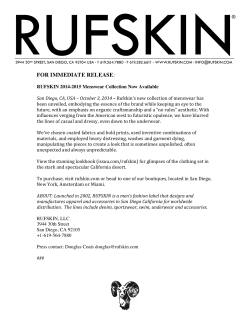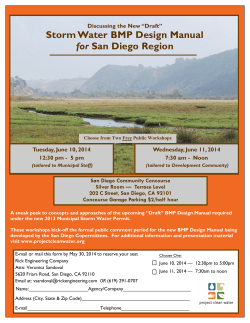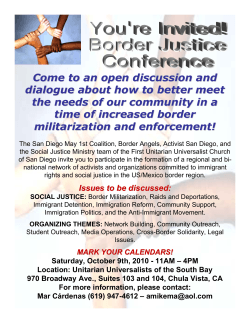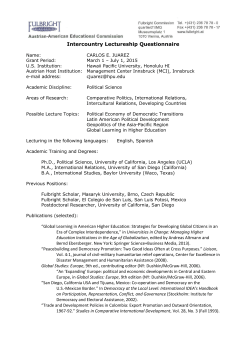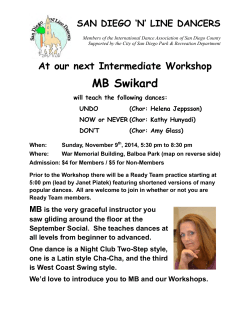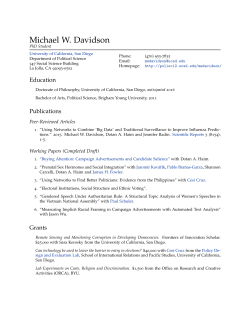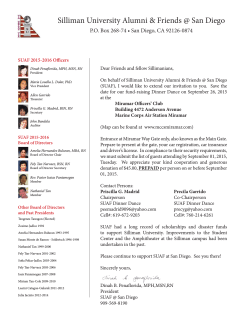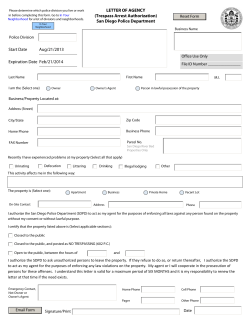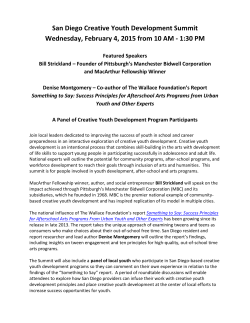
Curriculum vitae
LAUREN ASHLEY PAUL San Diego State University 5500 Campanile Drive San Diego, CA 92182 +858-922-1817 lololauren26862@gmail.com EDUCATION M.Sc. Candidate, Microbiology, 2012-present San Diego State University B.Sc., Biology, 2009 University of California San Diego Minor, Philosophy RESEARCH/PROFESSIONAL EXPERIENCE Graduate Student Researcher (M.Sc. Program in Microbiology), 09/2012-present San Diego State University, Dept. of Biology PI: Forest Rohwer • Performed fluorescent microscopy to quantify bacteriophages in environmental samples • Conducted marine microbial community metabolism studies using phenotypic arrays to explore bacteriophages as evolutionary agents • Developed data analysis pipelines and statistical approaches to evaluate bacteriophage influence on microbial growth Graduate Teaching Assistant, 10/2012-present San Diego State University, Dept. of Biology • Served as a TA for the Fundamentals of Microbiology Laboratory (Lab supervisor: Marlene DeMers) • Prepared and taught two lab sections per week for 32 students per semester • Developed and distributed tests and assignments Staff Research Associate I-II, 10/2009-10/2012 Scripps Institution of Oceanography, University of California San Diego Center for Marine Biotechnology and Biomedicine • Developed and performed cytotoxicity and antimicrobial bioassays to determine IC50 and/or MIC values of marine microbial extracts against a human colon carcinoma cell line (HCT-116) and methicillin-resistant Staphylococcus aureus (MRSA) • Performed flow cytometry to analyze cell cycle arrest by secondary metabolites • Discovered novel marine-derived bacterial taxa (development of microbial isolation and cultivation methods) & conducted independent studies to produce microbial secondary metabolites • Used molecular methods for the identification of isolated bacterial strains (DNA extraction, PCR, 16s sequence analysis) • Managed large-scale marine microbial fermentation program & prepared microbial extracts for LCMS analysis • Managed and maintained a Biosafety Level 2 laboratory • Supervised, hired, and trained staff & students in tissue culture, molecular, and microbiological methods 1 Laboratory Assistant, 06/2008-09/2009 Scripps Institution of Oceanography, University of California San Diego Center for Marine Biotechnology and Biomedicine • Conducted an independent study titled: Expression of new microbial secondary metabolites via non-traditional microbiological methods Clinical Internship, 10/2007-04/2008 Vein Institute of La Jolla, California PUBLICATIONS Jang, K. H., Nam, S-J., Locke, J. B., Kauffman, C. A., Beatty, D. S., Paul, L. A. and Fenical, W. (2013) Anthracimycin, a Potent Anthrax Antibiotic from a Marine-Derived Actinomycete. Angew. Chem. Int. Ed., 52: 7822–7824. doi: 10.1002/anie.201302749. Nam, S. J., Kauffman, C. A., Paul, L. A., Jensen, P. R., & Fenical, W. (2013). Actinoranone, a Cytotoxic Meroterpenoid of Unprecedented Structure from a Marine Adapted Streptomyces sp. Organic letters, 15(21), 5400-5403. Choi, E. J., Beatty, D. S., Paul, L. A., Fenical, W., & Jensen, P. R. (2013). Mooreia alkaloidigena gen. nov., sp. nov. and Catalinimonas alkaloidigena gen. nov., sp. nov., alkaloid-producing marine bacteria in the proposed families Mooreiaceae fam. nov. and Catalimonadaceae fam. nov. in the phylum Bacteroidetes. International Journal of Systematic and Evolutionary Microbiology, 63(Pt 4), 1219-1228. Bucarey, S. A., Penn, K., Paul, L. A., Fenical, W., & Jensen, P. R. (2012). Genetic Complementation of the Obligate Marine Actinobacterium Salinispora tropica with the Large Mechanosensitive Channel Gene mscL Rescues Cells from Osmotic Downshock. Applied and environmental microbiology, 78(12), 41754182. MANUSCRIPTS IN PREPARATION Paul, L.A., Sanchez, S.E., Wegley, L., Rohwer, F.L. Foreign bacteriophages drive marine microbial growth dynamics and functional metabolism. Choi, E.J., Nam, S-J., Paul, L.A., Beatty, D. S., Kauffman, C.A., Jensen, P.R., Fenical, W. Isolation of Uncultured Marine Bacterial Taxa Leads to New Alkaloid Producers. ACADEMIC PRESENTATIONS SDSU Student Research Symposium, oral, 2014 Title: The Capacity of Invasion: Investigating the influences of non-native phage communities on microbial metabolism Yosemite Symbiosis Workshop, oral, 2013 Title: Bacteriophage: Adherence and Evolution in Mucus and Environmental Surfaces SDSU Student Research Symposium, oral, 2013 Title: Hypervariable Immunoglobulin-like Domains: An Edge for Bacteriophage Adaptation to Their Hosts San Dieguito Academy, Biology class guest lecturer, Encinitas, CA, 2013 Title: Medicine from the Oceans 2 HONORS Anaheim Chamber of Commerce Gene Autry Humanitarian Award, 2004 LEADERSHIP/COMMUNITY Facilitator, IMSD/MARC Undergraduate Research Symposium, 2014 San Diego State University Collaborator, Phage Interdisciplinary Art-Science Project, 2014-present San Diego State University Mentor, SIO Summer Outreach Program, 2010-2012 Scripps Institution of Oceanography, University of California San Diego • Mentored Compton High School students during their academic exploration in the scientific fields and exposed them to research as a career • Prepared and supported the students through their transition into college Coach, Boys & Girls Track, 2008 Earl Warren Junior High School, Solana Beach, CA Volunteer, 2000-2004 Hoag Hospital, Newport Beach, CA Director, City-wide Toy Drive, 2000 Benefiting Hoag Hospital, Newport Beach, CA FIELD EXPERIENCE University of Guam & Saipan, 2011 Organization, SCUBA sediment collections and on-site microbial isolation California Channel Islands, 2010 Collection of deep-sea sediment samples British Virgin Islands, 2002 Assessment of local coral mortality CERTIFICATIONS SCUBA Certifications, 2000-present • Scripps Institution of Oceanography Scientific Research Diver (2011), PADI Divemaster (2008), Master Diver (2007), Research, Naturalist, Wreck, Multi-level, Night, and Rescue Diver (2002); extensive dive experience internationally Blood-borne Pathogens Certification, 2009-2012 University of California San Diego • Trained to work with human blood components & products, human cell lines, blood-borne pathogens, or other potentially infectious materials 3 M.SC. THESIS ABSTRACT The Capacity of Invasion: Investigating the influences of non-native phage communities on microbial metabolism Outnumbering their bacterial and archaeal hosts ten to one, phages (viruses that infect prokaryotes) are the most abundant and genetically diverse biological entities in the ocean. Many phage-driven dynamics have been described through predation, resulting in bacterial mortality. However, phages also promote diversity in their local microbial populations through horizontal gene transfer of advantageous genes. Recent studies have demonstrated that phages are able to infect and propagate in marine microorganisms from other aquatic regions. Hence, phages represent a mobile genetic pool that ensues significant implications for the evolutionary dynamics of microbes on a global scale. Using microbial metabolism as a proxy for phagemediated gene transfer, we explored the influences of non-native phage communities on populations of marine microbes. Here, marine microbial communities isolated from the Arctic, the Southern Line Islands, and San Diego were inoculated with a non-native phage community and monitored for growth over time. Results were evaluated under carbon-limited environments across a phenotypic array of 48 carbon sources. Preliminary data has revealed significant differences in host metabolic capabilities under viral pressure from foreign communities compared to native phage communities. Microbial populations inoculated with native phage fractions exhibited previously described top-down dynamics. The same host community grown with non-native phage demonstrated enhanced ability to utilize the carbon substrates available on the phenotypic array plates. In these communities, the acquisition and function of new metabolic capabilities will be identified using metagenomic sequencing. This populations approach to characterize fine-tuning imposed by foreign phage communities will provide insight into microbial physiology, shifts in community structure, and emerging virulence. REFERENCES Forest L. Rohwer, Ph.D. Professor of Biology Department of Biology, San Diego State University 5500 Campanile Drive, San Diego, CA 92182 +(619) 594-1336 frohwer@gmail.com William Fenical, Ph.D. Director, Center for Marine Biotechnology and Biomedicine Scripps Institution of Oceanography, University of California, San Diego Mail Code 0204 9500 Gilman Drive, La Jolla, CA 92093 +(858) 534-2133 wfenical@ucsd.edu Paul R. Jensen, Ph.D. Center for Marine Biotechnology and Biomedicine Scripps Institution of Oceanography, University of California, San Diego Mail Code 0204 9500 Gilman Drive, La Jolla, CA 92093 +(858) 534-7322 pjensen@ucsd.edu 4
© Copyright 2025
